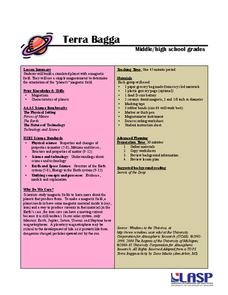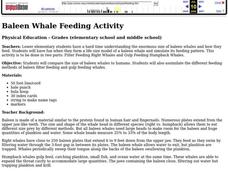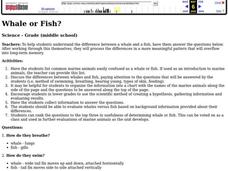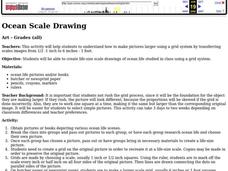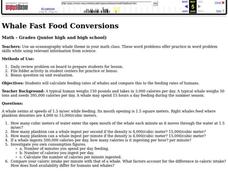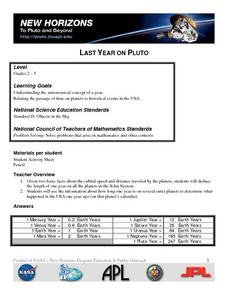Curated OER
Solar System
In this online interactive Solar System worksheet, students access a specific website to locate the multiple choice answers to 4 questions dealing with the Solar System. Students answer 3 short answer questions and draw a line connecting...
University of Colorado
Space Travel Guide
Neptune takes 164.8 Earth years to travel around the sun. In the fifth of 22 lessons, young scientists create a travel guide to a planet in our solar system. They provide tips for others on what to bring, what they see, and their...
Mr. Hill's Science Website
Solar System Fact Sheet
Here is a fantastic, educational handout packed with information and facts not only about the planets in our solar system, but also regarding major moons and their surface features, dwarf planets, comets, and asteroids.
Voyage Solar System
Round and Round We Go — Exploring Orbits in the Solar System
Math and science come together in this cross-curricular astronomy lesson plan on planetary motion. Starting off with a hands-on activity that engages the class in exploring the geometry of circles and ellipses, this lesson plan then...
Star Date
Astronomy Day from McDonald Observatory Solar System Scale Activity
Add a visual aid to your solar system lessons. Enthusiastic astronomers create a model depicting the nine planets and their distance from the sun.
University of Colorado
Rings and Things
Galileo first observed Saturn's rings in 1610. Through the use of a flashlight and baby powder, classes see how they can observe the rings of the outer planets from far away. Another demonstration shows how these rings, made of ice and...
University of Colorado
Terra Bagga
Earth's magnetic poles switch positions about every 200,000—300,000 years. In the activity, groups create a planet with a magnetic field. Once made, they use a magnetometer to determine the orientation of the planet's magnetic field....
University of Colorado
Terra Bagga
One way to identify possible volcanic activity on other planets is by testing the planet for magnetism. A science lesson begins with pupils constructing their own planet from a dead battery, magnets, paper, and tape before labeling the...
Curated OER
Exploring the Planets
Students study robotic spacecrafts that have provided detailed information about the inner and outer planets. In this exploring the planets lesson plan, students use posters and diagrams to study the various robotic spacecraft sent to...
Curated OER
Hopping Across the Solar System
Young scholars role-play and communicate that objects in space have describable properties, locations, and movements. Students identify and communicate effectively that Earth is the third planet from the Sun in the solar system, eight...
Vosonos
Interactive Minds: Solar System
Travel through space as you learn about the galaxy, solar system, planets, and much more. An extensive resource for studying astronomy in upper-elementary and middle school classrooms.
Virginia Department of Education
Solar System Model
How many planets can you name? Did you get all 13 in our solar system, including the dwarf planets, or were you surprised when you read there are 13 planets? The lesson helps scholars understand the scale of the universe including the...
Virginia Department of Education
Planet Line-Ups
Should Pluto be considered a planet or a dwarf planet? Scholars research planets in our solar system to understand their similarities and differences. It also includes memory activities related to the order of the planets.
Curated OER
Baleen Whale Feeding Activity
Young scholars compare the size of baleen whales to humans. They also assimilate the different feeding methods of baleen filter feeding and gulp feeding whales.
Curated OER
Whale or Fish?
Students explain the difference between a whale and a fish. After working through this themselves, they process the differences in a more meaningful pattern that overflows into long-term memory.
Curated OER
Water Pressure - Observing Water Flow
Students discover that pressure increases the deeper the ocean becomes. They determine how water pressure differs at various depths by observing water flow.
Curated OER
Create an Underwater Scene
Learners apply knowledge of underwater ocean life by creating an ocean life scene with marine animals and plants placed at appropriate ocean depths.
Curated OER
Oceanography Class Quilt
Pupils create and observe a collage of oceanography topics that be placed on quilt tiles in a culmination art project to represent information learned.
Curated OER
Ocean Scale Drawing
Students explain how to make pictures larger using a grid system by transferring scales images from 1/2 -1 inch to 6 inches - 1 foot. They create life-size scale drawings of ocean life studied in class using a grid system.
Curated OER
Whale Fast Food Conversions
Students calculate feeding rates of whales and compare this to the feeding rates of humans.
Curated OER
Is There Seaweed/Algae in Your Food?
Students discover that seaweed/algae is a small part of the resources the oceans provide. By investigating common household products, students discover that human senses are not enough to detect the presence of seaweed/algae in food.
Curated OER
Last Year on Pluto
Students examine the astronomical concept of a year. They relate the passage of time on planets to historical events in the USA.
Curated OER
Planet/Constellation Mobile
Pupils, through small group discussion, identify and share a rationale for shapes and patterns in the construction of a mobile that represents the solar system that makes them think of the creation of our solar system.
Curated OER
Exploring Our Solar System #1
Students examine the different theories on how our solar system was formed. They discover the order of the nine planets. They also identify the surface features of each planet.









